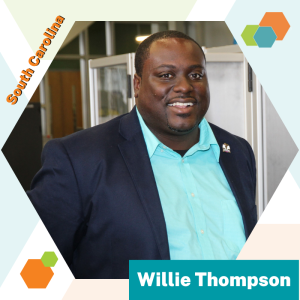I believe strongly in the value of clear pathways, both academic and career-focused, to create a pipeline of skilled talent.
Willie Thompson is the department head of mechatronics at Greenville Technical College in Greenville, SC, and a Fellow in the third cohort of the Postsecondary State CTE Leaders Fellowship at Advance CTE – Sponsored by ECMC Foundation.
 Q: Let’s start with your journey into CTE. How did your background shape your path into this field?
Q: Let’s start with your journey into CTE. How did your background shape your path into this field?
A: My journey into Career Technical Education (CTE) began in high school with a residential electricity class that sparked my interest in the technical field. After graduating, I attended Rowanty Vocational School to earn a certificate in residential electricity, then continued at ITT Tech, where I pursued a certificate in Electronics Communications Engineering Technology. Most of my postsecondary experience has been rooted in CTE programs. I had teachers and mentors who believed in me, challenged me, and introduced me to things I grew to love, like researching emerging technologies, which became a hobby. Their guidance and encouragement stuck with me. That’s why I chose to return to CTE, not just to work in the field, but to be a voice for learners and help guide them toward success.
Q: Bridging gaps by providing valuable academic and practical skills in advanced manufacturing & transportation technology in South Carolina is a focus of your current work. How are you initiating this work at your institution?
A: As the Academic Program Director of Mechatronics, I work alongside an incredible faculty team and industry partners to ensure our curriculum reflects both current and emerging technologies in advanced manufacturing. Our goal is to prepare learners for high-demand roles in the industry.
We collaborate with local high schools to build pathways that allow learners to earn college credit and develop hands-on skills in Mechatronics early on. We also support our industry partners by offering continuing education opportunities, helping their employees build confidence and competence with the latest technologies.
I believe strongly in the value of clear pathways, both academic and career-focused, to create a pipeline of skilled talent. These pathways open doors for learners through work-based learning experiences like internships, apprenticeships, and co-ops.
It’s not just about getting a job, it’s about building a sustainable career that supports a bright future.
Q: You’ve been vocal about assisting postsecondary learners with launching a successful career plan. Why do you think this is such a crucial issue?
A: Career planning is essential to learner success. It helps learners connect their education to real-world opportunities, stay motivated, and make informed choices about their future. A clear career path ensures they develop in-demand skills, avoid wasted time, and access meaningful, long-term opportunities.
It’s not just about getting a job, it’s about building a sustainable career that supports a bright future. For learners from the identified subgroups and special populations in Perkins V, strategic career planning can be especially powerful. It creates a pathway to stability, growth, and life-changing income for themselves and their families.
Q: You’ve spoken before about addressing systemic barriers by providing accessible and sustainable connections and relationships that promote professional success and academic collaboration. Can you share how this commitment has shaped your leadership and actions in your current role?
A: In my current role, I’ve prioritized building a sustainable pathway that connects learners, faculty, and industry partners. As the Academic Program Director and a mentor in the ASPIRE program, I’m committed to addressing systemic barriers and fostering relationships that lead to real growth. Building those relationships lays the foundation for hope, character development, and soft skills, critical tools for helping learners from all communities move forward.
Our team focuses on creating real-world opportunities, including face-to-face interactions between learners and industry partners before they even apply for jobs online. This direct exposure helps learners see that working for major companies isn’t out of reach; it’s possible. And that realization can be life-changing, not just for them, but for their communities as well.
Q: What do you see as the future of CTE in South Carolina and what challenges do you think need to be addressed?
A: The future of CTE in South Carolina is promising. We’re seeing growth in workforce development initiatives, expanded work-based learning credit options, and early career exposure starting as early as middle school. Programs like the SC Workforce Industry Needs Scholarship (SCWINS) are helping drive this momentum by covering tuition and fees for learners pursuing high-demand CTE fields.
One of the ongoing challenges, however, is changing public perception and raising awareness of CTE’s value. If we can shift how people view these programs, we can broaden participation and ensure that CTE reflects the full diversity of the communities we serve.
[D]irect exposure [to industry partners] helps learners see that working for major companies isn’t out of reach; it’s possible.
Q: You’re clearly passionate about creating long-term change. What advice would you give to others who want to make a difference in CTE and postsecondary participation and attainment?
A: Being an advocate for the community means addressing the barriers learners face when trying to attend school. We must ensure they have access to the resources needed to gain skills, earn credentials, and build lasting careers. It’s about more than education, it’s about opportunity.
Everyone, regardless of their background, should be exposed to a variety of career fields that might spark their interest and change the course of their lives. When we open those doors, we don’t just support individual success, we strengthen entire communities.
Q: As a participant in Advance CTE’s National Fellowship, what do you hope to gain from this experience?
A: As a participant in the Advance CTE National Fellowship, I’m eager to deepen my knowledge of the policies and best practices that drive high-quality CTE programs. I look forward to learning from experienced leaders across the country and bringing back innovative strategies to strengthen my community and the state of South Carolina.
This Fellowship will expand my professional network and allow me to explore new ways to align education, workforce, and industry. My goal is to help improve existing pathways and create new ones that connect learners to meaningful careers. I’m committed to contributing to transformative change that increases access and opportunity for all CTE learners.
Willie’s journey to CTE leadership underscores the importance of providing hands-on experiences to all learners. His insights are just one example of the incredible work being done by the Fellows of the Advance CTE National Fellowship. To learn more about Willie and other inspiring state leadership Fellows, visit the Postsecondary State CTE Leaders Fellowship page, where you can discover how CTE provides all learners with an opportunity to learn about and be prepared to enter into this nation’s competitive workforce.
If you are interested in launching a CTE Leadership Fellowship in your state please contact Dr. Kevin R. Johnson Sr. at [email protected].

